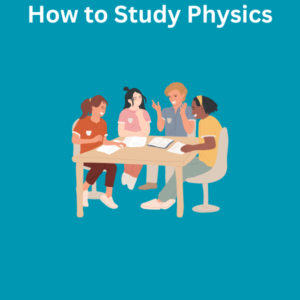Physics is a fascinating subject that helps us understand the universe, from the smallest particles to the largest galaxies. If you’ve ever wondered how things move, why they behave a certain way, or how the universe works, then learning physics can be your ticket to discovery. This guide will introduce you to the world of physics, provide tips for effective study, and answer common questions along the way.

What Is Physics?
Physics studies matter, energy, and the fundamental principles that govern their interactions. It’s a field that ranges from classical mechanics (think Newton’s laws of motion) to quantum physics, which deals with the strange behavior of particles on an atomic scale. Whether you’re studying physics for a class, considering an undergraduate physics program, or diving into graduate textbooks, the key is to build a strong foundation in the basic concepts.
Getting Started with Physics
- Build a Solid Mathematical Background
Physics is deeply intertwined with math. Topics like linear algebra, calculus, and basic mathematics are essential for solving physics problems and understanding core concepts. Start with introductory calculus books if you’re new to the math required. - Master the Basics
Begin with topics like classical mechanics, which are usually covered in the undergraduate physics curriculum. This area includes Newton’s laws, energy conservation, and motion. A good undergraduate classical mechanics course will set the stage for tackling more advanced topics. - Use Quality Resources
Some of the very best physics textbooks for beginners include those by Halliday, Resnick, and Walker. These books offer clear explanations and plenty of examples, making studying physics approachable and engaging.
Tips for Learning Physics
- Focus on Understanding, Not Memorization
Physics is about understanding the underlying principles, not just memorizing formulas. Break down physics concepts into words to ensure you truly grasp them. - Solve Problems Regularly
Problem-solving is at the heart of physics. Tackle homework problems from your physics class and use them to strengthen your physical intuition. Start with simple problems and gradually progress to more complex ones. - Relate Concepts to Real Life
Connecting abstract ideas to everyday experiences can make them easier to understand. For instance, think about how the principles of mechanics apply when driving a car or playing sports. - Experiment and Visualize
Physics is a hands-on science. Use experiments, simulations, or even videos to see concepts in action. Visualization helps deepen your understanding of undergraduate physics. - Seek Help When Needed
If you’re stuck, don’t hesitate to ask a physics teacher or classmates for help. Physics is a challenging subject, and collaboration often leads to breakthroughs.
Progressing in Physics
- Undergraduate Education: An undergraduate program covers a wide range of topics, including classical mechanics, quantum mechanics, and statistical mechanics. These are part of the undergraduate physics list that builds a foundation for more advanced studies.
- Graduate Level Physics: For those pursuing advanced degrees, the graduate physics core includes topics like graduate quantum mechanics, graduate-level electrodynamics covers, and graduate-level statistical mechanics. Graduate students typically focus on developing a very deep understanding of these subjects.
- Modern Physics and Beyond: Topics like modern physics, string theory, quantum field theory, and particle physics are exciting areas that require a solid mathematical background and a thorough understanding of quantum mechanics.
Frequently Asked Questions (FAQs)
1. How do I begin studying physics if I’m completely new?
Start with the basics, like classical mechanics and introductory calculus books. Build your math skills and focus on understanding the core concepts.
2. What is the best way to study physics effectively?
Solve many physics problems, focus on the fundamental principles, and use quality resources like graduate physics textbooks for advanced topics.
3. Do I need to be good at math to learn physics?
Yes, math is essential. Developing strong math skills in algebra, calculus, and linear algebra will help you navigate the undergraduate physics curriculum and beyond.
4. What topics are covered in an undergraduate physics program?
It covers classical mechanics, quantum mechanics, statistical mechanics, and more. These areas form the core of the undergraduate physics overview.
5. How do graduate students approach physics?
Graduate students typically focus on graduate coursework, including graduate-level statistical mechanics, and apply advanced techniques to tackle complex problems.
6. What if I struggle with physics concepts?
Physics is challenging, but persistence is key. Break down problems, seek help from a physics teacher, and revisit difficult topics until they make sense.
7. Can I study physics without pursuing a formal degree?
Absolutely! There are plenty of resources for self-learners, including modern high energy physics materials and very best physics textbooks.
